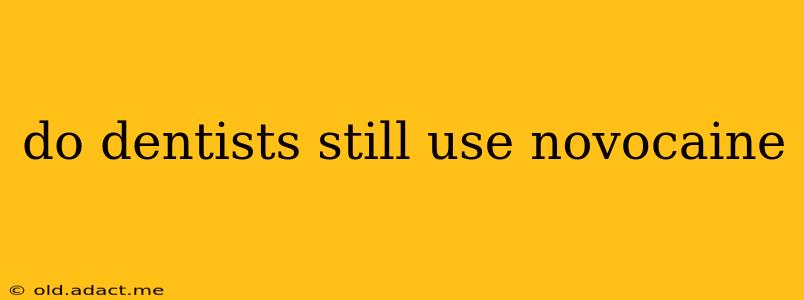Novocaine, a brand name for procaine, holds a significant place in the history of dentistry. Many associate it with the quintessential "dentist shot," evoking memories (sometimes not so fondly!) of dental procedures past. But does this iconic anesthetic still hold a place in modern dental practices? The short answer is: not as much as it used to. While procaine itself isn't commonly used anymore, the principles behind its function have paved the way for a range of more effective and safer anesthetic options.
What is Novocaine?
Before diving into current practices, let's understand what Novocaine actually is. Procaine (Novocaine being the brand name) is a local anesthetic that works by temporarily blocking nerve signals in a specific area. This prevents the transmission of pain signals to the brain during dental procedures. It was a revolutionary advancement in dentistry when it was introduced, significantly improving the patient experience.
Why Don't Dentists Use Novocaine as Much Anymore?
While effective, procaine has several limitations that have led to its decreased use in modern dentistry:
-
Shorter Duration of Action: Compared to newer anesthetics, Novocaine's numbing effect doesn't last as long. This means patients might experience pain returning sooner, requiring more injections or longer procedure times.
-
Lower Potency: Novocaine is less potent than many modern alternatives, meaning higher concentrations are needed to achieve the same level of anesthesia. This could potentially increase the risk of side effects.
-
Potential for Allergic Reactions: Although rare, allergic reactions to procaine are possible. Dentists now have safer, less allergenic options available.
What Anesthetics Do Dentists Use Instead?
Modern dentistry utilizes a variety of local anesthetics, each offering advantages in terms of efficacy, duration, and safety profile. Some of the most commonly used include:
-
Lidocaine: This is currently the most widely used local anesthetic in dentistry due to its rapid onset, relatively long duration, and low toxicity.
-
Bupivacaine: This anesthetic provides a longer-lasting numbing effect, making it useful for longer procedures.
-
Articaine: This is another popular choice because it's effective even in areas with poor blood flow.
Are There Any Situations Where Procaine Might Still Be Used?
While not a common choice, there might be extremely rare circumstances where a dentist might opt for procaine. This could potentially be due to a patient's specific allergy or other unique medical considerations. However, such instances are highly unusual, and a dentist would thoroughly evaluate the patient's medical history before using such an older anesthetic.
How is Anesthesia Administered Today?
Modern anesthetic administration techniques have also advanced beyond simple injections. Techniques like computerized anesthesia delivery systems allow for precise and controlled anesthetic administration, minimizing discomfort and optimizing effectiveness. Dentists often combine local anesthetics with other techniques to further enhance pain management, such as nitrous oxide ("laughing gas") or oral sedatives.
What are the Side Effects of Local Anesthetics?
Side effects from local anesthetics are generally mild and temporary. They can include temporary numbness, slight bleeding at the injection site, and in rare cases, allergic reactions. Dentists carefully monitor patients during and after the procedure to address any potential complications.
Is Novocaine Safe?
While Novocaine itself is generally considered safe for use, its limitations and the availability of superior alternatives explain its declining use in contemporary dental practice. Modern anesthetics offer improved efficacy, longer duration, and a lower risk of complications.
This information is for general knowledge and shouldn't be considered medical advice. Always consult your dentist or healthcare professional for any questions or concerns regarding dental anesthesia and procedures.
